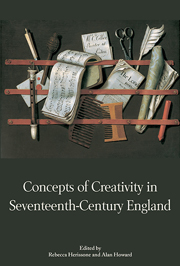Book contents
- Frontmatter
- Contents
- List of Illustrations
- List of Contributors
- Preface
- Introduction
- Creating to Order: Patronage and the Creative Act
- Creative Identity and the Role of Print Media
- 3 Author, Musician, Composer: Creator? Figuring Musical Creativity in Print at the Turn of the Seventeenth Century
- 4 Published Musical Variants and Creativity: An Overview of John Playford's Role as Editor
- Mapping Knowledge: The Visual Representation of Ideas
- Authorial Identity
- Imitation and Arrangement
- The Performer as Creator
- Bibliography
- Index
3 - Author, Musician, Composer: Creator? Figuring Musical Creativity in Print at the Turn of the Seventeenth Century
from Creative Identity and the Role of Print Media
Published online by Cambridge University Press: 05 March 2014
- Frontmatter
- Contents
- List of Illustrations
- List of Contributors
- Preface
- Introduction
- Creating to Order: Patronage and the Creative Act
- Creative Identity and the Role of Print Media
- 3 Author, Musician, Composer: Creator? Figuring Musical Creativity in Print at the Turn of the Seventeenth Century
- 4 Published Musical Variants and Creativity: An Overview of John Playford's Role as Editor
- Mapping Knowledge: The Visual Representation of Ideas
- Authorial Identity
- Imitation and Arrangement
- The Performer as Creator
- Bibliography
- Index
Summary
Over the past twenty-five years much ink has been spilt by literary scholars of the early modern period over issues relating to creativity, notions of authorship and the influence and impact of print technology. While Edmund Spenser's foray into print has been described as an act of ‘textual self-monumentalization, the publication of Ben Jonson's Workes in 1616 has been proclaimed, in Joseph Loewenstein's words, as ‘a major event in the history of what one might call the bibliographic ego’. At the turn of the seventeenth century English composers including William Byrd, Thomas Morley and John Dowland also chose actively to disseminate their works in single-author printed books on which their name was imprinted as ‘author’ and through which they, and others, were able to advertise their musical skills and reputations. Although the focus on interpreting figurations of authorship within the printed book in early modern England has remained primarily literary, the circumstances surrounding music printing in the final decades of the sixteenth century and the irst of the seventeenth created conditions in which the same issues pertaining to intellectual property arose for some composers, leading them to assert their own ‘bibliographic egos’ even before the 1616 literary landmark.
Jeremy L. Smith makes such a claim about Byrd's apparently close editorial involvement in the printing of his works, particularly the multiple editions of his Psalmes, Sonets and Songs, first published in 1588.
- Type
- Chapter
- Information
- Concepts of Creativity in Seventeenth-Century England , pp. 63 - 86Publisher: Boydell & BrewerPrint publication year: 2013

